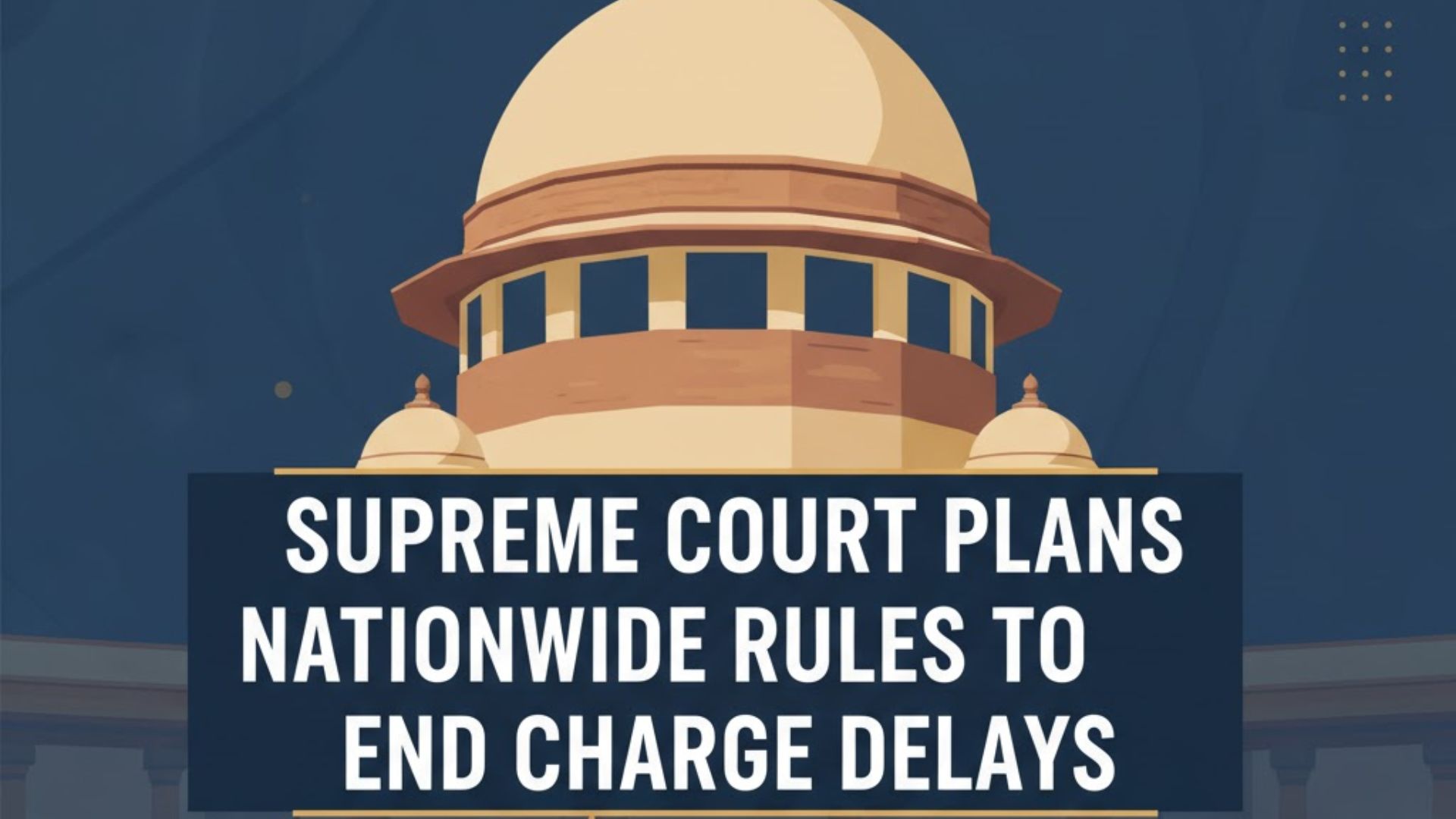
Supreme Court Plans Pan-India Guidelines to End Delays in Framing Charges
Top Court says timely framing of charges is key to faster justice
Move expected to reduce undertrial prisoners and ease burden on courts
By Our Legal Reporter
New Delhi: October 29, 2025: The Supreme Court of India has raised serious concerns about the long delays in framing charges in criminal trials, which often result in prolonged imprisonment of undertrial prisoners. A bench of Justices Aravind Kumar and N.V. Anjaria has indicated that the Court may soon issue nationwide guidelines to ensure that trial courts across India follow a fixed timeline for framing charges.
This development came during the hearing of a bail plea filed by Aman Kumar, an undertrial prisoner from Bihar, who has been in jail since August 2024 in a robbery and attempted murder case. Despite the chargesheet being filed in September 2024, charges had not been framed even after several months, prompting the Court to intervene.
Why the Supreme Court Stepped In
- Delays in framing charges are one of the main reasons for the slow pace of criminal trials in India.
- Many undertrial prisoners spend years in jail without their cases moving forward.
- The Court noted that this situation violates the principle of “justice delayed is justice denied.”
The bench observed that such delays are unacceptable and highlighted that Section 251(b) of the Bharatiya Nagarik Suraksha Sanhita (BNSS) already requires charges to be framed within 60 days in cases triable by a sessions court. However, in practice, this rule is often ignored.
Appointment of Amicus Curiae
To assist in framing guidelines, the Court has appointed Senior Advocate Sidharth Luthra as amicus curiae (friend of the court). He will help the Court draft a framework that can be applied uniformly across all states.
The Court also directed the State of Bihar’s counsel to assist in the matter, since the case originated from Bihar.
The Larger Problem of Undertrial Prisoners
India has one of the highest numbers of undertrial prisoners in the world. According to the National Crime Records Bureau (NCRB), nearly 75% of India’s prison population consists of undertrials.
- Many of these prisoners are poor and cannot afford bail.
- Delays in framing charges mean their trials do not even begin.
- This leads to overcrowded prisons and denial of basic rights.
The Supreme Court has repeatedly stressed that speedy trial is a fundamental right under Article 21 of the Constitution.
Past Observations by the Supreme Court
This is not the first time the Supreme Court has flagged the issue. In several earlier judgments, the Court has:
- Directed trial courts to avoid unnecessary adjournments.
- Stressed the need for judicial accountability in handling criminal cases.
- Suggested that technology and case management systems be used to track delays.
However, despite these directions, delays continue to plague the system.
Possible Guidelines the Court May Issue
While the final guidelines are yet to be announced, legal experts believe the Court may:
- Fix a strict timeline (such as 60 or 90 days) for framing charges after the chargesheet is filed.
- Mandate accountability for judges and prosecutors if deadlines are not met.
- Introduce monitoring mechanisms to track compliance across states.
- Allow exceptions only in rare cases, such as when evidence is incomplete.
Such guidelines would bring uniformity across India and prevent arbitrary delays.
Reactions from Legal Experts
Legal experts have welcomed the move, saying it could be a game-changer for India’s criminal justice system.
- Advocates argue that timely framing of charges will ensure that trials begin without delay.
- Human rights activists say it will protect the rights of undertrial prisoners.
- Judicial reformers believe it will reduce the burden on higher courts, which often deal with bail pleas arising from trial delays.
Impact on the Justice System
If implemented, the guidelines could have far-reaching effects:
- Faster trials and reduced pendency of cases.
- Lower prison overcrowding, as undertrials will not be kept in jail indefinitely.
- Greater public trust in the justice system.
- Improved efficiency in trial courts.
Conclusion
The Supreme Court’s move to consider pan-India guidelines on framing charges is a significant step towards judicial reform. By setting strict timelines, the Court aims to ensure that justice is not denied due to procedural delays.
This initiative could mark a turning point in India’s criminal justice system, bringing relief to thousands of undertrial prisoners and restoring faith in the principle of speedy justice.
ALSO READ POPULAR ARTICLES
-
Supreme Court Halts GST Assessment on Joint Development Deals
-
Supreme Court Explains Demurrer Law in Neelkanth Realty Case
-
Supreme Court Opens Door for Vodafone Idea Relief in AGR Case
-
Delhi High Court Rules No Alimony for Financially Independent Spouse
-
Akshay Kumar Moves NCLAT Against Edtech Firm Over ₹4.83 Cr Dispute
-
SC Quashes Chhattisgarh Tender Clause Favoring Local Bidders
-
SC to Examine Validity of Securities Transaction Tax on Trading
-
SC Defers Vodafone Idea ₹5,606 Crore AGR Dues Hearing to Oct 13
-
Punjab & Haryana HC: Bail Can’t Be Cancelled for Seeking Hearing Exemptions
-
Delhi HC Protects Mankind Pharma’s ‘Kind’ Trademark, Bars Similar Names
-
Delhi HC Appoints Justice Rajiv Shakdher as Arbitrator in Playboy Bar Dispute
-
Karisma Kapoor’s Kids Challenge Sunjay Kapur’s Will in Delhi HC
-
SC Questions Dual Madras HC Hearings, Reserves Verdict on TVK Plea
-
SC Lets Judicial Officers With 7 Years Bar Apply for District Judge
-
SC to Hear Vijay’s TVK Plea Against SIT Probe in Karur Stampede
-
SC Probes Financial Irregularities in Indiabulls Housing: ED
-
Delhi HC Quashes 22-Year-Old Case Against Lawyer Over Basement Office
-
SC Seeks Rehab Plan for Cadets Injured During Military Training
-
SC PIL Seeks CBI Probe, Nationwide Review on Cough Syrup Deaths
-
Delhi HC Hikes Land Compensation for Yamuna Project Villagers
-
Punjab & Haryana HC: Bail Can’t Be Denied Over No Permanent Home
-
SC: Appellate Courts Can Correct Trial Court Evidence Errors